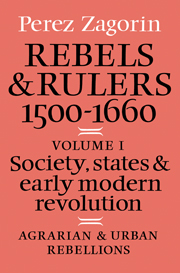4 - Monarchy, absolutism, political system
Published online by Cambridge University Press: 12 January 2010
Summary
In Richard II, Shakespeare puts into the king's mouth this expression of the mystique of royalty:
Not all the water in the rough rude sea
Can wash the balm off from an anointed king;
The breath of worldly men cannot depose
The deputy elected by the Lord.
Many other passages of the play are preoccupied with variations on the same theme. Thus,
What subject can give sentence on his king?
And shall the figure of God's majesty,
His captain, steward, deputy elect,
Anointed, crowned …
Be judged by subject and inferior breath
… O! forfend it, God …
And:
no hand of blood and bone
Can gripe the sacred handle of our sceptre
Unless he do profane, steal, or usurp.
Yet Richard II is the true story of a rebellion and the deposition of a king. And it was to illustrate rebellion that the earl of Essex had this same play performed in London in February 1601, on the eve of his unsuccessful coup against Queen Elizabeth that led him to the scaffold; while the queen herself, prompted by the symbolism of the performance, declared, “I am Richard II; know ye not that?”
These texts provide a fitting introduction to the view of another basic context of our early modern revolutions, the government and political system of the royal states with their exaltation of rulers, on the one hand, and the inherent conflicts, strains, and weaknesses that made them prone to certain types of revolution, on the other.
- Type
- Chapter
- Information
- Rebels and Rulers, 1500–1600Society, States, and Early Modern Revolution, pp. 87 - 121Publisher: Cambridge University PressPrint publication year: 1982



